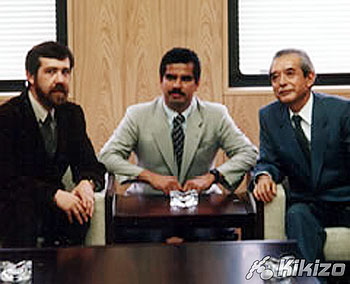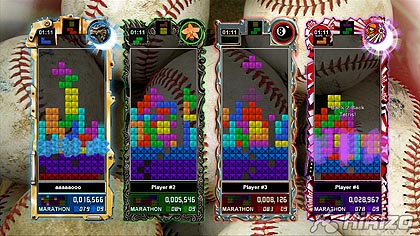Interview: Tetris - The Making of an Icon
We interview two game prodigies, Alexey Pajitnov & Henk Rogers, whose fascinating story behind Tetris goes right to the top of NCL - with plenty of twists along the way.
Page 6
Henk Rogers Interview
 Kikizo: You were born in Holland right? Are you still Dutch?
Kikizo: You were born in Holland right? Are you still Dutch?
Henk Rogers: Yes, I still have Dutch citizenship but since last year I have dual citizenship - I finally got US citizenship last year.
Kikizo: Why did you wait so long to get US citizenship?
Rogers: A variety of reasons really. I lived in Japan for quite a while, and there is a lot that can be improved with the US policy right now, so I finally decided to become American and be part of making the changes the country must go through.
Kikizo: Can you tell us a little bit more about your family background?
Rogers: Well, both of my natural parents were Dutch Indonesian and my stepfather is American. Thats how I got the name Rogers and ended up in New York, at the age of 11.
Kikizo: Did you stay in touch with the country you were born in?
Rogers: Yes of course, it's been a while now so I need to get back as soon as possible.
Kikizo: Why is that?
Rogers: I love Dutch Licorice, I need to go back to stock up on that stuff.
Kikizo: [Laughs] So you moved to the US and that's where your love for videogames started?
Rogers: Exactly. At college we had one of those early big mainframe computers. You know, those things with huge tapes and stuff on. I was fascinated with them and started to play computer games and tried writing them myself. This was before games became commercial programs and computers only really existed at universities and banks.
 Kikizo: After graduating you decided to move to Japan. Why did you decide to do that?
Kikizo: After graduating you decided to move to Japan. Why did you decide to do that?
Rogers: [Laughs] Well, during my studies there was this Japanese girl I really liked and when she went back to Japan I chased after her and ended up staying in Japan for like 18 years.
Kikizo: The old boy-meets-girl-and-chases-her-around-the-world story, then. [Laughs] How good are your Japanese skills?
Rogers: I can speak it quite well but I refuse to learn kanji.
Kikizo: Any particular reason for that?
Rogers: The way I see it is that everything can be done with a Roman alphabet and Arabic numerals. Kanji on the other hand forces you to memorize thousands of symbols, and when you do that with a growing kid it stifles creativity because the brain gets trained to memorize rather then be creative with a smaller subset of symbols. It limits the creativity by forcing you into memorizing rather than creating so I always refused to learn it out of principle. I feel it's counterproductive and stifles creativity.
Kikizo: And in Japan you started your own videogame company right?
Rogers: Yes I started Bullet Proof Software, and we actually produced the very first Japanese RPG.
Kikizo: When did you leave BPS, and why?
Rogers: I left BPS in 1995 and moved to San Francisco because there was this unstoppable thing coming up called the Internet, and I wanted to be part of that emerging, growing industry. I saw its potential and wanted to become part of its growth and Japan back then was the wrong place to be to take advantage of that growing market.
Kikizo: Why was that?
Rogers: Mostly because in those days in Japan NTT (Nippon Telephone and Telegraph) had a telecommunications monopoly and because the Internet in Japan used to be prohibitively expensive; the Internet access prices were insanely inflated, so I went to the Bay Area where everything was happening.
Kikizo: That makes sense. Let's talk about Tetris a bit then.
Rogers: OK.
 Kikizo: The stories about Hiroshi Yamauchi's shark-like business practices are the stuff legends are made of, so how did you as a foreigner convince someone who was so feared in the industry to license Tetris from you?
Kikizo: The stories about Hiroshi Yamauchi's shark-like business practices are the stuff legends are made of, so how did you as a foreigner convince someone who was so feared in the industry to license Tetris from you?
Rogers: That wasn't entirely my achievement. I made my pitch to Mr Yamauchi and he decided to ask Shigeru Miyamoto about it. So he calls Miyamoto into the room and asks him about this Tetris game and Miyamoto tells him that a lot of the people at Nintendo are playing the game during their lunch breaks or even when they should be working. At that point I think Mr Yamauchi realized the potential of the game.
Kikizo: So what do you think about Yamauchi and the reputation he has?
Rogers: I have great respect for him as a businessman and we get along great. It's been a few years now but we used to play Go - it's a Japanese game of strategy and many old-school Japanese business people think it sharpens your business skills.
Kikizo: We heard that you get along with Mr Yamauchi much better than his own daughter and son-in-law, Minoru Arakawa [former president of Nintendo of America], do.
Rogers: Where do you hear such things?
Kikizo: As a member of the press we sometimes hear things we shouldn't from drunk company representatives at press events and parties.
Rogers: [Laughs] OK. Well, yeah, you would have to ask the Arakawas about that.
Kikizo: Before you convinced Mr Yamauchi, though, you had to convince Arakawa for the Tetris deal, right?
Rogers: Sort of. I actually did the Tetris on Game Boy deal with Mr Arakawa. We didn't have a final deal and instead I had talked with him about licensing Tetris for handhelds, and he gave me his word that he would do the Tetris deal through me.
Kikizo: So you went to Russia to try to get a license for the handheld rights of the game even though you didn't have a final deal yourself?
Rogers: Yeah, you could say that.
Kikizo: And then you had to fight off Mirrorsoft, which was part of the late Robert Maxwell's media empire?
Rogers: Actually Mirrorsoft was in the hands of Robert's son, Kevin Maxwell. I don't think he got involved in it too much himself and as it turned out Mirrorsoft had been sub-licensing the Tetris license unjustly to several other companies, so we used that as leverage. There also was a lot of pressure on ELORG [Elektronorgtechnica, former Soviet Ministry of Software and Hardware Export] to give full licensing rights of the game to Mirrorsoft but Perestroika and Glasnost had started to get a hold of old Soviet Russia so we managed to get the license after all. And after that Arakawa had to decide on the Game Boy pack-in game between Tetris and Mario. He obviously made the right choice. [laughs] And the rest is history.







 Satoru Iwata Video Interview - the late Nintendo president spoke with Kikizo in 2004 as 'Nintendo Revolution' loomed.
Satoru Iwata Video Interview - the late Nintendo president spoke with Kikizo in 2004 as 'Nintendo Revolution' loomed. Kaz Hirai Video Interview - the first of Kikizo's interviews with the man who went on to become global head of Sony.
Kaz Hirai Video Interview - the first of Kikizo's interviews with the man who went on to become global head of Sony. Ed Fries Video Interview - one of Xbox's founders discusses an epic journey from Excel to Xbox.
Ed Fries Video Interview - one of Xbox's founders discusses an epic journey from Excel to Xbox. Yu Suzuki, the Kikizo Interview - we spend time with one of gaming's most revered creators.
Yu Suzuki, the Kikizo Interview - we spend time with one of gaming's most revered creators. Tetris - The Making of an Icon: Alexey Pajitnov and Henk Rogers reveal the fascinating story behind Tetris
Tetris - The Making of an Icon: Alexey Pajitnov and Henk Rogers reveal the fascinating story behind Tetris Rare founders, Chris and Tim Stamper - their only interview? Genuinely 'rare' sit down with founders of the legendary studio.
Rare founders, Chris and Tim Stamper - their only interview? Genuinely 'rare' sit down with founders of the legendary studio. The History of First-Person Shooters - a retrospective, from Maze War to Modern Warfare
The History of First-Person Shooters - a retrospective, from Maze War to Modern Warfare